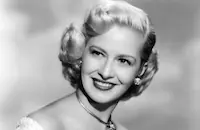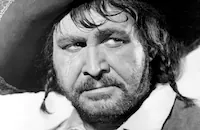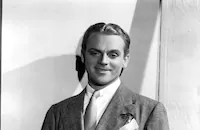Arizona Bushwhackers
Brief Synopsis
Cast & Crew
Lesley Selander
Howard Keel
Yvonne De Carlo
John Ireland
Marilyn Maxwell
Scott Brady
Film Details
Technical Specs

Synopsis
Lee Travis, a captured Confederate riverboat gambler and gunfighter, is given the opportunity to join the Union Army and help bring law and order to the West. When residents of Colton, Arizona, learn that a turncoat is going to replace Sheriff Grover, everyone complains except Mayor Joe Smith. He hopes that Travis can help rout Tom Rile, who has been bribing the corrupt Grover; in truth, however, Travis is a Southern spy assigned to transport arms and ammunition hidden near the town to a group of Confederate soldiers. Hoping to rid the town of the drunks and bums hanging around Rile's saloon and gambling house, Travis wins the saloon from Rile in a dice game, then closes the place and orders Rile out of town. Travis learns from bar girl Molly, whom he has mistaken for his Confederate contact, that Rile has been selling weapons to Apaches. Realizing that Rile has been availing himself of the hidden Confederate supplies, Travis tries to apprehend him but is shot and taken to a doctor by milliner Jill Wyler, who, he has learned, is his contact. In the meantime, Dan Shelby, Grover's deputy, discovers that Travis and Jill are spies and is about to turn them over to Mayor Smith when Grover returns to announce that the war is over. The ex-sheriff also informs the mayor that Rile and the Indians are about to attack the town. The small band of citizens defend themselves against the raid, killing Rile, his gunmen, and most of the Apaches. Jill and Shelby are romantically united, and Travis gives Molly the deed to the saloon before riding out of town.

Director
Lesley Selander
Cast

Howard Keel

Yvonne De Carlo

John Ireland

Marilyn Maxwell
Scott Brady

Brian Donlevy

Barton Maclane

James Craig
Roy Rogers Jr.
Reg Parton
Monty Montana
Eric Cody

James Cagney
Crew
Robert R. Benton
Andrew Craddock
Joe Edmondson
Steve Fisher
Steve Fisher
Robert Goodstein
Jimmie Haskell
Dale Hutchinson
Paul K. Lerpae
A. C. Lyles
Nellie Manley
Hal Pereira
Al Roelofs
John F. Schreyer
Lester Shorr
Jerry Welch
Wally Westmore
John Wilkinson

Film Details
Technical Specs

Articles
TCM Remembers Howard Keel this Monday, Nov. 15th
PLEASE NOTE SCHEDULE CHANGE
6:00 AM
Callaway Went Thataway (1951)
7:30 AM
Ride, Vaquero! (1953)
9:30 AM
War Wagon (1967)
11:30 AM
"MGM Parade Show #14"
(Keel talks with George Murphy about his latest MGM picture "Kismet")(1955)
12:00 PM
Showboat (1951)
2:00 PM
Kiss Me Kate (1953)
4:00 PM
Seven Brides for Seven Brothers (1954)
6:00 PM
Kismet (1955)
HOWARD KEEL (1919-2004):
Howard Keel, the strapping singer and actor whose glorious baritone took him to stardom in the early '50s in some of MGM's best musicals, including Showboat, Kiss Me Kate and Seven Brides for Seven Brothers, died on November 7 of colon cancer at his home in Palm Desert, California. He was 85.
He was born Harry Clifford Leek on April 13, 1919, in Gillespie, Illinois. His father, was a coal miner and his mother, a strict Methodist, forbid the children from enjoying popular entertainments. When his dad died, his mother relocated the family to California when Harry was still a young teenager.
After he graduated high school, Keel had a brief stint as a singing busboy, but had not considered a professional career as a vocalist....until one fateful evening in 1939. It was at this time he saw celebrated opera singer, Lawrence Tibbett, at the Hollywood Bowl. Keel was inspired, and he soon began taking voice lessons. Over the next several years, he carefully trained his voice while entering any singing contest he could find. It wasn't long before his talents caught the attention of Rodgers & Hammerstein.
In 1946, they signed him to replace John Raitt in the Broadway production of Carousel, changed his name to Howard Keel (His proper surname Leek spelled backwards), and Keel was on his way to international stardom.
After his run in Carousel ended, he sailed to London the following year to play the role of Curley in Rodgers & Hammerstein's Oklahoma. He received rave reviews from the London press, and by the time he returned to the United States in 1948, he was ready to make his move into films.
Keel made his movie debut in the British thriller, The Small Voice (1948), but it would be his second film, and first for MGM, portraying Frank Butler, Betty Hutton's leading man in Annie Get Your Gun (1950), that sealed his success. Keel's several strengths as a performer: his supple, commanding singing voice; his athletic, 6'4" frame; striking, "matinee-idol" good looks; and his good humored personality made him one of the studios' top leading men over the next few years. Indeed, between 1951-55, Keel could do not wrong with the material he was given: Show Boat (1951), Lovely to Look at (1952), Kiss Me Kate (1953), Seven Brides for Seven Brothers (1954), and Kismet (1955). Clearly, he was a shining star in this golden era of the MGM musical.
By the late '50s, movie musicals began to fade out of fashion, but Keel returned to the stage and had success performing with several touring companies. He made a brief return to films when he was cast as a seaman battling carnivorous plants from outer space in the popular British sci-fi hit, The Day of the Triffids (1962). Television also provided some work, where he guest starred in some of the more popular shows in the late '60s including Run For Your Life, and The Lucy Show.
Keel would keep a low profile over the next decade, but he made an amazing comeback in 1981, when he was cast as Clayton Farlow, Ellie Ewing's (Barbara Bel Geddes) second husband in the wildly successful prime time soap, Dallas. Not only did he play the role for ten seasons, but Keel would also be in demand for many other shows throughout the '80s and '90s: The Love Boat, Fantasy Island, Murder, She Wrote, Hart to Hart, and Walker, Texas Ranger, to name a but a few. By the late-'90s, Keel retired to his home in Palm Desert, California, where still made public appearances now and again for a tribute or benefit. He is survived by his wife of 34 years, Judy; a son, Gunnar; daughters, Kaija, Kristina and Leslie; 10 grandchildren, and one great-granddaughter.
by Michael T. Toole
Important Milestones on Howard Keel:
1933:
Moved to Southern California at age 16 (date approximate)
Worked as a singing busboy in a Los Angeles cafe
Worked for Douglas Aircraft as a manufacturing representative travelling among various company plants; work included singing; won a first prize award at the Mississippi Valley while on the road; also won an award at the Chicago Music Festival
Began singing career with the American Music Theatre in Pasadena, California
Chosen by Oscar Hammerstein II to perform on Broadway in "Carousel"; succeeded John Raitt in the leading role of Billy Bigelow; also took over the leading role of Curly in "Oklahoma"
1947:
Recreated the role of Curly when he opened the London stage production of "Oklahoma"
1948:
Made feature film debut in a non-singing supporting role in the British crime drama, "The Small Voice"
1950:
Signed by MGM; became instant star as the male lead of "Annie Get Your Gun"
1951:
Provided the offscreen narration for the Western saga, "Across the Wide Missouri", starring Clark Gable
1951:
First film opposite Kathryn Grayson, "Show Boat"
1952:
First leading role in a non-musical, "Desperate Search"
1954:
Made best-remembered film, "Seven Brides for Seven Brothers"
1955:
Last musical starring roles, and last musicals for MGM, "Jupiter's Darling" and "Kismet"
1958:
Went to Britain to play the leading role in the action drama, "Floods of Fear"
1967:
Last leading role, "Red Tomahawk"
1968:
Last feature film appearance for over 20 years, "Arizona Bushwhackers"
Starred on the London stage in the musical "Ambassador"; later brought the role to Broadway (date approximate)
Toured the nightclub circuit, sometimes teaming up with his co-star from three MGM musicals of the 1950s, Kathryn Grayson
Toured in stage productions of musicals and comedies including "Camelot", "Man of La Mancha", "Paint Your Wagon", "I Do! I Do!", "Plaza Suite", "Gigi", "Show Boat", "Kismet", "The Most Happy Fella" and "The Fantasticks"
1977:
Teamed with Jane Powell on record-breaking national theater tour of "South Pacific"
1978:
Reprised screen role of eldest brother Adam in a touring stage version of "Seven Brides for Seven Brothers", opposite original screen co-star Jane Powell
Joined the cast of the CBS primetime serial drama, "Dallas", which had premiered in 1978; played Clayton Farlow
1983:
Recorded first solo album, "And I Love You So"
1994:
Was one of the hosts of the feature compilation documentary, "That's Entertainment III", revisiting the MGM musical from the coming of sound through the late 1950s
Keel was President of the Screen Actors Guild from 1958-1959.

TCM Remembers Howard Keel this Monday, Nov. 15th PLEASE NOTE SCHEDULE CHANGE
Quotes
I didn't know you had any dealing with the Indians.- Sheriff Lloyd Grover
You still don't know. That's what I pay you for...not to know anything.- Tom Rile
What is it, Tom? Are you selling the Apaches whiskey or guns?- Sheriff Lloyd Grover
You better put that blindfold back on.- Tom Rile
It's no wonder you got so many gunslingers working for you.- Sheriff Lloyd Grover
Mr. Grover, hadn't you better take some of this?- Dan Shelby
What for?- Sheriff Lloyd Grover
A man can't live without money.- Dan Shelby
I'll you something, son. When it's that kind of money, a man can't live with it.- Sheriff Lloyd Grover
Trivia
Miscellaneous Notes
Released in United States Spring March 1968
Techniscope
Released in United States Spring March 1968













